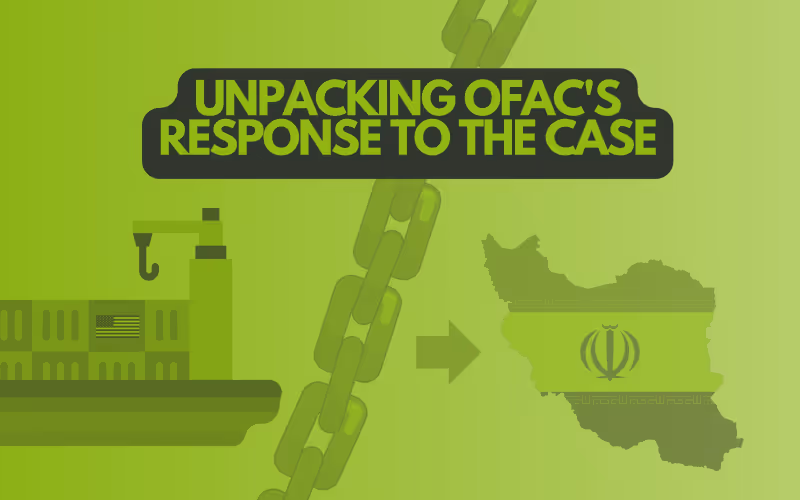
Iran Sanctions: OFAC Penalizes Building Materials Firm
Last week (at the time of writing), OFAC slapped a six-figure fine on a New Jersey-based building materials vendor for apparent Iran sanctions violations. And do you know what? It's hardly made a ripple in the media. No one is talking about it. But do you know who should be taking note? Compliance officers. Because buried in the nine-page OFAC settlement agreement regarding the case is a treasure trove of insights you need to know about.
And here is the good news: You don't need to read the lengthy settlement agreement because this sanctions.io article will summarize the key takeaways (but you can click here for the full PDF).
But before we do that, let's quickly review the ins and outs of the penalty.
Construction Specialties 2023 OFAC Penalty: Here's What Happened
On August 16, 2023, the US Office of Foreign Assets Control (OFAC) published an enforcement release stating it had settled with Construction Specialties (CS) Inc. for $660,594 related to apparent violations of the Iranian Transactions and Sanctions Regulations by the company's subsidiary (CSME) in the United Arab Emirates (UAE).
At the crux of the penalty is this: A CS employee from the US, working in the subsidiary's Dubai office, overheard local senior managers discussing a "big job" - this is how OFAC described the scenario in its enforcement media release.
The suspicious employee dug for further information and found evidence of concealment, corroborating their suspicion that the company had exported goods to Iran. The employee returned home to the US and reported their suspicions to CS headquarters.
And to cut to the chase, CS immediately terminated all Iran-related business activity and the employees involved. The New Jersey-headquartered company then voluntarily reported the incident to OFAC.
OFAC states that between December 4, 2016, and August 3, 2017, under the local GM's direction, the CS subsidiary in the UAE imported goods from CS and another supplier in the US to the UAE and then knowingly reexported them to Iran.
Now that we know what happened, let's unpack what OFAC said about the case and what we can learn.
OFAC’s Treasure Trove of Compliance Insights From the CS Case
Anyone who has read an OFAC settlement report knows they don't write them to engage the reader - coffee may be necessary for the regular person who stumbles upon them when entering an Internet rabbit hole.
But they can make compelling reading for sanctions, compliance, and anti-money laundering (AML) professionals.
Why? Because they reveal how OFAC is responding to violations in the here and now. And that is highly valuable, especially because part of a compliance officer's job is to protect their organization by closely following the ever-evolving landscape of regulations and potential OFAC violations.
And OFAC's latest settlement agreement regarding the sanctions violations case with CS stands out.
But how so?
The settlement terms - see page 3 in this PDF - between OFAC, CS, and its subsidiary CSME runs through to page 9. That's longer than usual. And remember this: It's seven pages of OFAC publicly providing fresh and highly relevant required actions and expectations in a 2023 context.
Now, don't worry. We aren't going through every item in the wordy report. However, we will now reveal the most salient points.
Number 1: Invest in Information Technology Solutions
A key theme running through the settlement (the settlement is fundamentally OFAC telling CS what they must do not to be penalized again) is this: allocate adequate resources to information technology solutions that match its risk profile.
What does this exactly mean?
It means OFAC expects businesses to embrace regulation technology (RegTech) solutions and global sanctions databases that allow for effective sanctions screening at scale within an organization. Solutions such as:
And if your company doesn't invest in sanctions screening technology that meets your specific risk profile, then not only are you more likely to violate sanctions laws, but the penalty levied on your business will probably be even higher.
Why? Because OFAC wants to see that organizations are serious about sanctions compliance.
And in 2023, with cost-effective solutions now available even to small businesses and bootstrapped startups (OFAC knows this very well), investing in sanctions screening technology is an absolute prerequisite for doing business.
Recommended reading from the blog: Root Causes for OFAC Sanctions Violations
Number 2: Get Management Committed to Promoting a Compliance Culture
At sanctions.io, we follow the trends that shape the compliance world. And once again, in this latest OFAC penalty issued to building materials vendor, Construction Specialties, the problem of failing compliance cultures has resurfaced once again.
This is what OFAC said:
Respondent commits to ensuring that senior management promotes a "culture of compliance" throughout the organization.
In 2023, failings in a compliance culture repeatedly appear as a contributing factor for sanctions violations. And in this case, OFAC is sending a crystal clear public message:
Be sure to foster a compliance culture in your organization.
As many compliance officers reading know all too well, this is an issue that's simmering in compliance circles. It's also created debate over on the sanctions.io LinkedIn page, where articles are posted (feel free to follow sanctions on LinkedIn to receive updates).
In this blog post, we can't dive into this complicated issue. But questions many compliance professionals ponder when thinking about this problem include:
- Do all companies really care about financial penalties, given that it means very little to their bottom line?
- Do financial penalties even work, given that repeat offenders are common? Are there better ways?
- Why does it appear that some compliance officers in sanctions violation cases (likely to know of the violations) keep quiet? Where was the personal accountability?
- Shouldn't HR departments be more involved in promoting a compliance culture?
Recommended reading from the blog - Beyond Box Ticking: 5 Tips for Compliance Officers to Show Business Value
Number 3: Attention to Detail is a Key Skill Compliance Officers Require
It's important to note that we don't know the specifics of the OFAC case against Construction Specialties. Where the blame can be apportioned, for example, if it was negligence on the part of the compliance team, a lack of resources and budget, or a combination of both, is pure speculation.
But what we do know is that OFAC doesn't mess about when it comes to details.
The settlement agreement calls for CS to make improvements in many daily bread-and-butter duties of sanctions compliance officers, indicating issues such as:
- Inadequate sanctions risk assessments
- Poor employee training regarding sanctions compliance
- Ineffective (or lack of) audits
- Shortcomings in sanctions screening effectiveness testing
And the bottom line is this: If OFAC is this meticulous at unraveling problems in sanctions compliance programs, then this case should remind all compliance officers to approach their job with an unwavering commitment and attention to detail that the profession demands.
Closing Thoughts and How sanctions.io Can Help
This article is part of a series of reports that reveal key insights from recent sanctions and AML violations in 2023. Here are more from the blog:
- Key Takeaways From Deutsche Bank's $186 Million Sanctions and AML Penalty
- Microsoft's 2023 Sanctions Penalties: 5 Key Learning Points
- Learning From BAT's $635M North Korea Sanctions Fine: 5 Key Insights
- Unravelling Swedbank's $3.4 million OFAC Sanctions Penalty: 3 Key Insights
To learn more about how our sanctions, PEP, and criminal watchlist screening service can support your organization's compliance program:
7-Day Free Trial (No Credit Card Required)
We offer a free 7-day trial (no credit card is required) and will be delighted to walk you through our service. sanctions.io is a highly reliable and cost-effective solution for sanction checking. AI-powered and with an enterprise-grade API with 99.99% uptime are reasons why customers globally trust us with their sanctions screening needs.



